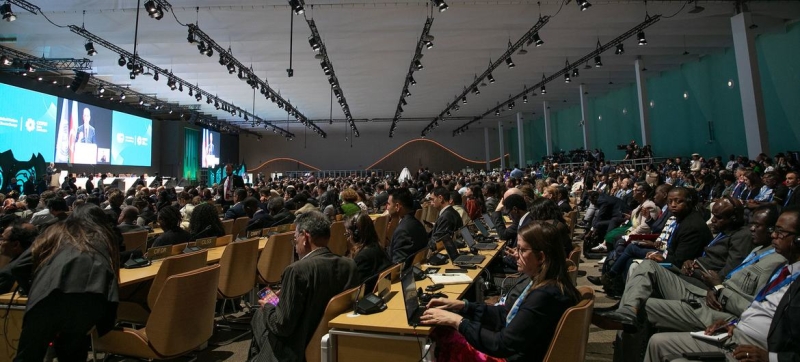
The UN Climate Conference Conference room in Baku. COP29 results: $300 billion to combat climate crisis, developing countries demand more Climate and environment
Talks at the UN climate conference in Baku ended early Sunday morning with rich countries pledging to invest at least $300 billion a year to combat climate change. Developing countries, which had been seeking more than $1 trillion in support, called the deal an “insult,” saying they needed far more resources to effectively combat the climate crisis.
After two weeks of intense negotiations, delegates to the 29th Conference of the Parties to the UN Framework Convention on Climate Change (UNFCCC) agreed to gradually increase annual funding to $1.3 trillion by 2035.
Countries also agreed on rules for global carbon credit trading, which will encourage countries to cut emissions and invest in green projects.
“A more ambitious outcome”
Commenting on the COP29 outcome, UN Secretary-General António Guterres said that while the agreement was absolutely necessary to keep global warming to 1.5 degrees Celsius, he “had hoped for a more ambitious outcome – both in terms of finance and mitigation – to tackle the scale of the challenge we face.”
However, the UN chief continued, the agreement provides a basis for further action. For many vulnerable countries, it is a glimmer of hope, but only if the commitments are implemented quickly. “They must be implemented in full and on time. The commitments must quickly become real finance. All countries must come together to ensure that the highest goal is achieved,” the Secretary-General added.
In addition to financing, COP29 discussed emissions reduction targets, accelerating the energy transition and an agreement on carbon markets. Much has been achieved despite an “uncertain and divided geopolitical landscape.”
The UN chief thanked negotiators for finding common ground, saying: “You have shown that the multilateral process, based on the Paris Agreement, can address the most difficult issues.”
“An insurance policy for the world”
UNFCCC Executive Secretary Simon Still called the new climate finance target an “insurance policy” for everyone on the planet.
“This deal will further grow the clean energy market and protect billions of lives. This will help all countries reap the enormous benefits of bold climate action: more jobs, faster growth, cheaper and cleaner energy for all. But like any insurance policy, it only works if premiums are paid in full and on time,” he said.
He acknowledged that no country ultimately got everything it wanted from COP29. The world still has a lot of work to do, including in preparation for the next climate conference in Brazil, he stressed.
